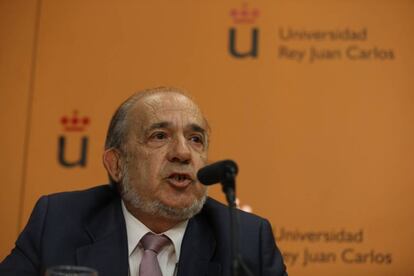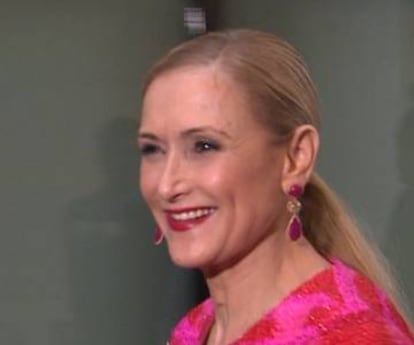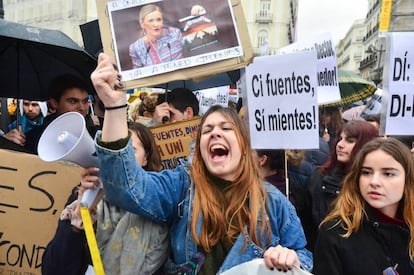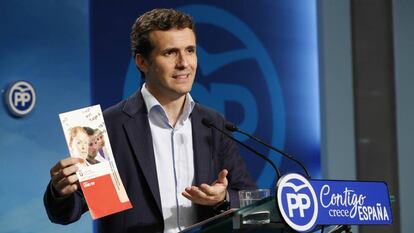University official suspended in ongoing master’s degree scandal
Madrid premier Cristina Cifuentes considers returning the qualification, but even that may not save her career

A growing scandal involving the academic background of Madrid regional leader Cristina Cifuentes continued to have a ripple effect on Friday, when an official from the leading public university that awarded the qualification was suspended from his post.
Enrique Álvarez Conde, director of the Public Law Institute at King Juan Carlos University (URJC) in Madrid, has been suspended by university officials over his alleged role in the case, said university sources.
The most logical thing is for Ms Cifuentes to resign and to have an interim candidate
Inés Arrimadas, Ciudadanos

Madrid premier Cifuentes, of the Popular Party (PP), obtained a master’s degree from this school in 2012, but online newspaper eldiario.es recently revealed that she never completed the coursework and that someone altered her grades transcript to make it look as if she had.
It has since emerged that Cifuentes never attended classes or took exams. She has been unable to produce her final thesis, which she claims to have defended before an examining panel on July 2 of that year.
The case, which until then had focused on alleged bad practices at a university with strong ties to the PP, morphed into a criminal investigation when the signatures on a document produced by Cifuentes to prove that she defended her thesis turned out to be forged.
Álvarez Conde, the head of the Public Law Institute, last week said that he was pressured by top university officials into producing a document that would back up Cifuentes’ claim about completing her degree, even though no official record existed in the university’s files.
University president Javier Ramos has denied pressuring Álvarez Conde. On Friday, he presided over a meeting of officials, who decided to suspend the Institute director. In another decision, all of the university’s schools and departments will undergo an internal investigation. The university employee who altered Cifuentes’ transcript has been sanctioned, said sources familiar with the content of the meeting.

Wavering support
While Cifuentes has so far refused to resign over the case despite pressure from the opposition to do so, her own party’s initial support has been wavering in recent days. Justice Minister Rafael Catalá, also of the PP, said on Friday that he hopes “Cifuentes will make the decisions that need to be made.”
In statements to Onda Cero radio station, Catalá noted that “we started out with a statement from her saying, ‘I’ve got my diplomas, my certificates, my papers,’ and it sounded very reasonable. Later we learned that it seems some of the signatures on those papers are not authentic, and that her work hasn’t shown up, and that an inspection by the Conference of Rectors has also raised some doubts.”
The opposition Socialists and left-wing anti-austerity party Podemos are backing a no-confidence motion against Cifuentes in the regional assembly, while Ciudadanos, whose support is pivotal to the PP’s minority government, is now asking for her resignation after several days of hesitation. “The most logical thing is for Ms Cifuentes to resign and to have an interim candidate. The government of Madrid should not be imperiled over a few months,” said party official Inés Arrimadas, alluding to the fact that regional elections are scheduled for 2019.
The situation has reached such a breaking point that Cifuentes is reportedly considering returning the degree, said sources familiar with the matter. But even if she could, it is unclear whether it would be enough to save her political career at this point.
The inflated CV of Pablo Casado

Cifuentes is not the only PP politician whose resume has come under scrutiny. Pablo Casado, a congressman and deputy secretary of communication for the conservative group, also studied at the URJC Public Law Institute, where he obtained a similar degree to Cifuentes’ a few years earlier. Following an EL PAÍS investigation, Casado has admitted that he did not go to class or take exams with other students, either. He said there was no need for a thesis defense as the system was different back then.
The 37-year-old’s resume boasts two bachelor’s degrees, one masters’ degree from URJC, courses at top Spanish business schools, and postgraduate or teaching activities at three of the most prestigious universities in the US, including Harvard.
While he has often talked about his "postgraduate programs at Georgetown and Harvard," the latter was in fact the Driving Government Performance Program at Harvard University's Kennedy School of Government – a one-week course costing €8,800 and with no academic requirements.
“I can’t quite remember its duration, but yes it was short, an executive course,” said Casado on Tuesday in response to queries from this newspaper. He added that he paid for the course out of pocket, including the airfare.
However, Spanish online daily eldiario.es revealed on Thursday that the Harvard course was actually taken by Casado not in the US but in the Madrid suburb of Aravaca, and lasted just four days. Casado has confirmed that this is true.
As for his Georgetown experience, Casado’s resume includes a “CLS from the Government Affairs Institute.” The only matching degree is the Certificate in Legislative Studies, an 18-month program that requires class attendance. Casado claims he took the course in the summer of 2008, when he was already holding several public positions in Spain that would have made it hard to take an extended leave.
Casado's resume also says he was a "visiting professor at the Georgetown Global Leadership and Competiveness Program" in 2009 and 2010. Program director Ricardo Ernst confirmed via email that Casado gave lectures there "very successfully." Experts consulted by this newspaper said a better description would be "guest speaker" or "visiting lecturer."
English version by Susana Urra.
Tu suscripción se está usando en otro dispositivo
¿Quieres añadir otro usuario a tu suscripción?
Si continúas leyendo en este dispositivo, no se podrá leer en el otro.
FlechaTu suscripción se está usando en otro dispositivo y solo puedes acceder a EL PAÍS desde un dispositivo a la vez.
Si quieres compartir tu cuenta, cambia tu suscripción a la modalidad Premium, así podrás añadir otro usuario. Cada uno accederá con su propia cuenta de email, lo que os permitirá personalizar vuestra experiencia en EL PAÍS.
¿Tienes una suscripción de empresa? Accede aquí para contratar más cuentas.
En el caso de no saber quién está usando tu cuenta, te recomendamos cambiar tu contraseña aquí.
Si decides continuar compartiendo tu cuenta, este mensaje se mostrará en tu dispositivo y en el de la otra persona que está usando tu cuenta de forma indefinida, afectando a tu experiencia de lectura. Puedes consultar aquí los términos y condiciones de la suscripción digital.








































